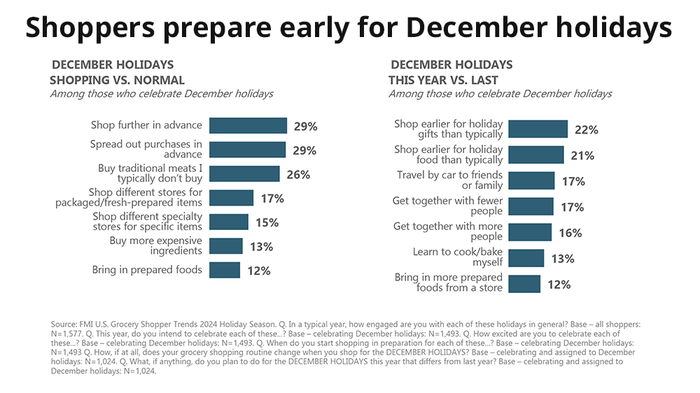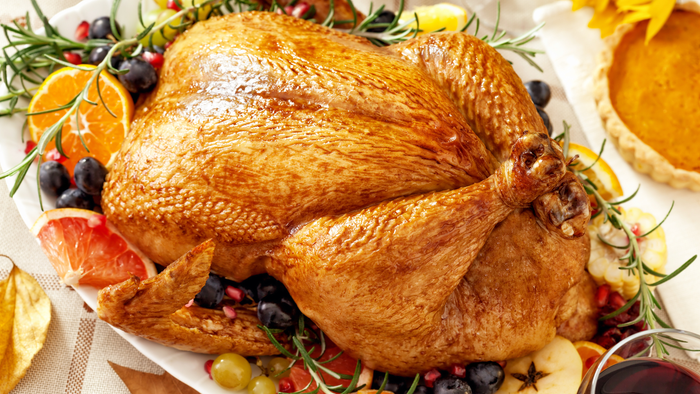FMI study: Holiday shoppers prioritize food, family
Natural retailers should expect 21% of shoppers to hit grocery stores earlier this year than in 2023. More plan to purchase prepared foods, as well. Get the data.
November 25, 2024

At a Glance
- In December, shoppers are likely to start shopping earlier and spread out their purchases, according to the survey.
- Although two-thirds of shoppers are concerned about grocery prices, they are still excited about the holidays.
- FMI reports that six in 10 holiday shoppers consider family meals to be highly valuable.
The fall and winter holidays represent some of the busiest times of the year for food retail. Most grocery stores spend weeks or even months gearing up for the rushes that Thanksgiving, Hanukkah, Christmas, Kwanzaa and even New Years Eve can bring.
By this point, with Turkey Day less than a week away, most independent natural products retailers are probably as prepared for this holiday as they can be. Still, a little last-minute intel on shopper sentiments, dinner menus and projected purchases never hurts.
FMI, the Food Industry Association provides this and more in U.S. Grocery Shopper Trends: Holiday Season 2024. FMI’s latest report presents data captured from 1,577 consumers nationwide in late September and early October. The survey results reveal how shoppers plan to celebrate the upcoming fall and winter holidays, how they intend to grocery shop and which foods, beverages and other items they expect to buy. Let’s dig in.
Excitement abounds
FMI’s survey confirms that the overwhelming majority of consumers plan to celebrate at least one upcoming holiday, with most partaking in several. And even though 67% express some concern about high grocery prices, people are predominantly looking forward to these festivities.
“It’s clear that shoppers, despite feeling some anxiety, are maintaining that strong sense of excitement and enthusiasm about the holidays,” Steve Markenson, vice president of research and insights at FMI, said in a November 18 press briefing on the new report. “In fact, we found that 73% of shoppers report feeling either very or somewhat excited about the holidays—and particularly Thanksgiving at 84% and the December holidays at 88%.”
Food makes the holiday
FMI asked shoppers which elements they feel make for a successful holiday, so that when they look back on it later, they’ll view it as a great one.
“Fun, harmonious time with family and friends” emerged as the most popular response, chosen by 59% of consumers. But right behind that was a “great homemade feast,” marked by 32%. As Markenson noted, this underscores the central role that food, specifically memorable holiday meals, play in these festivities for families nationwide.
As for what else goes into a successful holiday, “successful gift giving” was the third most selected response (22%) while “having stayed within budget” landed in fourth place (20%).

Credit: FMI
Budgeting celebrations
Speaking of budget, consumers plan to allocate the bulk of their holiday budgets toward gifts and special meals. When FMI asked shoppers whether they were concerned about prices rising on key holiday foods, nearly half said yes, with 22% saying they are very concerned and 25% being extremely concerned. All in all, consumers are more worried about prices escalating at the grocery store than on travel, gifts and any other areas of expense this fall and winter.
That said, shoppers are prepared to deal with high prices on holiday food, FMI found, using many of the same strategies they use throughout the year. These include hunting for deals, buying on sale, switching brands, buying more store brands and purchasing fewer items from fresh-prepared departments.
“One of the main takeaways here is, despite the high level of concern about food prices, shoppers are feeling pretty confident in managing and being in control of their grocery budgets this holiday season,” Markenson said.
Thanksgiving shopping patterns
Zeroing in on Thanksgiving, FMI asked survey participants whether and how their grocery shopping routines change ahead of this holiday. While 25% say they shop no differently in late November than the rest of the year, the vast majority report at least some alteration.
The most common change, noted by 31% of shoppers, is purchasing traditional meats they don’t usually buy. After that, respondents report that they spread out purchases in advance (25%), shop further in advance (24%), shop at different stores for specific items (20%), make additional trips to the usual store (17%), shop across specialty stores for specific items (14%) and buy more expensive ingredients (12%).
FMI’s research also reveals that a whopping 56% of shoppers who celebrate Thanksgiving switch their primary store for holiday food and beverage purchasing. Most often, these consumers cross into another channel to get their needs met—moving from a supermarket to a club store, for example, or from a conventional supermarket to a natural products store. That is more common than switching to another store within the same channel, i.e., patronizing a different supermarket than the one they normally frequent.

FMI found that turkey is still the most common main dish served on Thanksgiving. Credit: Canva
Turkey, taters and stuffing still rule
What’s for dinner this Thanksgiving? Two-thirds of the survey pool plans to serve turkey, which should come as no surprise. A bit more surprising, perhaps, is that fewer than half of those folks (47%) intend to prep the bird from scratch at home; 29% plan to purchase fresh-prepared turkey from a store.
Also on most menus will be mashed potatoes (61%) and stuffing (57%). Among those serving these two Thanksgiving classics, 60% will whip up the spuds from scratch while 48% will make their own stuffing.
Beyond the “big three,” other dishes planned for this holiday include warm vegetable sides, which 37% of shoppers say they’ll serve, followed by a vegetable-based main dish (34%) and salad (34%). For each of those three, more than half of shoppers plan to make them at home.
The next most popular items, according to the survey, are fruit salad (23%), meat other than turkey (20%), other potato dish (19%) and other appetizers (18%).
But food and beverage aren’t all shoppers are buying for their Thanksgiving celebrations. According to FMI’s poll, 55% also purchase nonfood items to liven up their gatherings, including seasonal paper products, home décor and table decorations, purchasing many of these products right from the grocery store.
Looking ahead to December holidays
Among shoppers surveyed by FMI, 95% will participate in at least one December holiday, whether Hanukkah, Christmas or Kwanzaa.
Just as with Thanksgiving, most people who celebrate these occasions—70%, to be exact—will alter their grocery shopping routines somewhat to prepare. Here, the most common changes are shopping further in advance and spread out purchases in advance, each selected by 29% of shoppers.
Next, chosen by 26%, is buy traditional meats I typically don’t buy, which was shoppers’ No. 1 change for Thanksgiving. After that, it was shop different stores for packaged and fresh-prepared items (17%), shop different specialty stores for specific items (15%), buy more expensive ingredients (13%) and bring in prepared foods (12%).
This article originally appeared on New Hope Network, an Organic Produce Network sister website. Visit the site for more trends and insights into the natural and organic products industry.
Read more about:
Industry Resources


